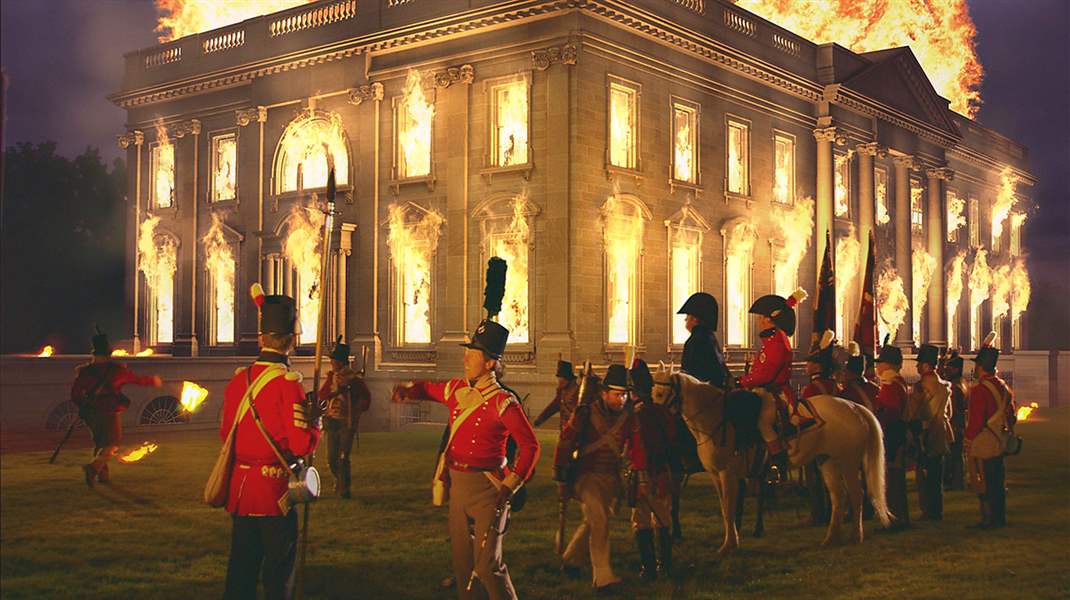
COMMENTARY
The War of 1812: Canadians remember a lot more than we do
12/8/2013
This re-enactment of British troops burning the White House was part of the History Channel show “First Invasion: The War of 1812,” partially filmed at Fort Meigs State Memorial in Perrysburg.
NATIVE SUN PRODUCTIONS/GARY FOREMAN

David M. Shribman
NIAGARA-ON-THE-LAKE, Ontario — You can see the United States from here, across the raging Niagara River. But even if you couldn’t, you could be sure that hardly anyone over there is making much of this week’s bicentenary of an event that shattered this town, sowed bitterness that persisted for generations, and shaped a continent.
Two centuries ago this Tuesday, American troops who had occupied this small community for seven months abandoned their snowy redoubt in a region then called Upper Canada. They left the town — by that time occupied almost exclusively by women, the men having left to serve in the British army or in various militia — in flames and smoke.
The War of 1812 produced several moments of unfettered brutality. None, except perhaps for the burning of Washington, D.C., was as piteous as this one.
On Dec. 10, 1813, the residents of this area — a Loyalist village, in American eyes — stood calf-deep in snow in a ruthless chill and watched their homes, shops, churches, and schools lie smoldering in ruin. All their possessions, their clothes, and their memories were consumed by fire.
This cruelty in Newark, as Niagara-on-the-Lake was known then, may have prompted the British the following year to exercise no restraint in attacking Buffalo and other New York communities, in filibustering throughout the American frontier, and in burning the American capital.
At the distance of two centuries, confrontations such as the War of 1812, itself a sideshow to the Napoleonic Wars, seem like quaint artifacts of another time — the hardships somehow more fabled than fearful, the human costs more anecdotal than actual.
Today, for Americans the burning of the White House in August, 1814, is a mere curiosity. As for the victims of the earlier torching in what we now call Ontario, they are a historical trifle, bit players in someone else’s story.
Not so, once you realize the importance of what happened here, in a country Americans mostly ignore, during a war Americans mostly have forgotten, in an episode Americans mostly have repressed.
We can’t cure American historical amnesia, but we can fill in the human dimensions of a war whose North American combatants, in the phrase of the great Canadian historian Pierre Berton, “did not invite the war, did not care about the issues, and did not want to fight.”
Like the French and Indian War a half-century earlier, this was a European struggle that — messily, maddeningly, and ultimately, murderously — lapped up upon the eastern shores of the New World. In so doing, it forced men to fight a war whose causes they barely understood, even though the stakes could barely be larger — control of the wild, rich, and mostly unexplored land mass of North America.
One lesson of the episode might be that great, sweeping historical forces brush aside small groups of individuals — tragic figures of collateral damage during big shifts among great powers and even in small movements of military units.

This re-enactment of British troops burning the White House was part of the History Channel show “First Invasion: The War of 1812,” partially filmed at Fort Meigs State Memorial in Perrysburg.
One such unit was commanded by Brig. Gen. George McClure, which laid waste to Newark, a place that Michael Smith, an American visitor, described in 1812 as “a beautiful and prosperous place of much trade inhabited by a civil and industrious people.”
Capt. William Hamilton Merritt, who arrived in town a day after the fires were set, reported seeing “[n]othing but heaps of coals and the streets full of furniture that the inhabitants were fortunate enough to get out of their houses.” Only one house, maybe two, stood undamaged.
We Americans are paying almost no mind to this moment in history, but little of it is ignored in Canada. The residents of this town — an art haven by virtue of its Shaw Festival theaters — are marking this historical moment with commemoration and introspection.
The town is planning a torchlight cemetery procession, a candlelight service, a series of inspirational readings, musical performances, a commemorative bonfire, and an outdoor flag ceremony. It is a moment of reflection and remembrance about a war of which so many have no memory.
General McClure initiated the burning of Newark out of concern it could become a staging area for savage British attacks. Instead, it became the pretext for savage British attacks.
That is an irony of history, reminding us that in wars remembered as well as forgotten, there is nothing more ironic than history.
David Shribman is executive editor of the Pittsburgh Post-Gazette.
Contact him at: dshribman@post-gazette.com